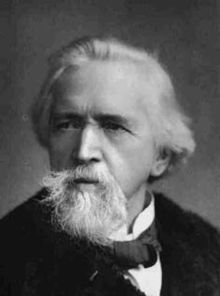George Jacob Holyoake
George Jacob Holyoake (born April 13, 1817 in Birmingham , † January 22, 1906 in Brighton ) was an English writer and agitator who represented concerns of the labor movement , freethinking and the cooperative movement .
Life
Holyoake was the second of 13 children and came from a humble background. His father George was a foreman in a foundry, his mother Catherine a button maker. The family's initially relatively good economic situation deteriorated dramatically. Holyoake himself initially only received elementary school education and became an apprentice in a foundry at the age of nine. In 1831, at the age of 14, he was already involved in the Reform League in his hometown and thus began his lifelong participation in political and social movements. From 1834 Holyoake attended courses at the Mechanics' Institute for several years in addition to his work in the foundry. He heard lectures by Robert Owens , who had a profound influence on his thinking, and agreed to continue the atheist weekly Oracle of Reason , initiated by Charles Southwell in 1841, after the publisher's arrest for blasphemy . Holyoake himself, however, was arrested after giving a lecture of his own in Cheltenham on Owen's ideas and sentenced as an atheist to six months in prison. Holyoake was the last Englishman to serve a prison sentence for this public opinion . After his release, Holyoake coined the term 'secularism' to denote his views and represented them in the thirty years of the magazine The Reasoner, which he founded in 1846 . A trial brought against him by the government led to the abolition of the newspaper stamp in England; Holyoake was also significantly involved in the passing of that law (Evidence Amendment act of 1869), which granted civil assurance the same legal force as the Christian oath. He also gave the suggestion and the plan for the blue books which the Foreign Office had Lord Clarendon draw up on the conditions of the working classes in foreign countries .
Holyoake's writings on the cooperative system have been noticed throughout Europe. His work The history of co-operation in Rochdale (1872) brought about 250 workers' cooperatives into being within two years and has been translated many times. His main work is the History of Co-operation in England (London 1875–1879, 2 vol .; 3rd edition 1885).
literature
- Barbara J. Blaszak: George Jacob Holyoake (1817-1906) and the Development of the British Cooperative Movement , Edwin Mellen Press, 1988
See also
Web links
- Detailed description of his life and work (English)
- Extract from Google Books (Blaszak)
- Literature by George Holyoake in the catalog of the GVK - Joint Union Catalog / Union Catalog
| personal data | |
|---|---|
| SURNAME | Holyoake, George Jacob |
| ALTERNATIVE NAMES | Holyoake, George James (incorrect naming) |
| BRIEF DESCRIPTION | English social politician |
| DATE OF BIRTH | April 13, 1817 |
| PLACE OF BIRTH | Birmingham |
| DATE OF DEATH | January 22, 1906 |
| Place of death | Brighton |

